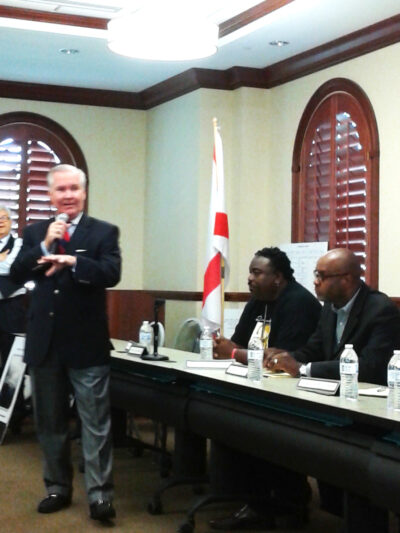News & Commentary
If You’re Black or Brown and Ride a Bike in Tampa, Watch Out: Police Find That Suspicious
By Nusrat Choudhury, Staff Attorney, ACLU's Racial Justice Program
The Tampa Bay Times' recent disclosure that police are targeting Blacks who ride bicycles — including children as young as three years old — for dramatically high rates of stops and searches is the latest piece in the nationwide debate about racial profiling that has followed the police-involved deaths of Michael Brown, Eric Garner, Walter Scott, Freddie Gray, and countless others.
Communities across the country are connecting the deluge of incidents in which police use force against Blacks (or, as in Gray's case, show gross disregard for Black life) to everyday interactions in which police stop, frisk, and search Blacks and Latinos because of their race, rather than evidence of wrongdoing — a practice well-documented in New York, Boston, Philadelphia, and Ferguson. The latest reports from Tampa underscore just how little progress has been made in rooting out racial profiling and how the routine over policing of communities of color can lead to interactions that tragically devolve into the use of force.
By Guest Blog- ACLU National

A Community Conversation on Race Relations and Policing in Tampa
Last week, I attended a Town Hall in Tampa that was convened by Attorney Barry Cohen to address race relations and law enforcement. There was a panel of 14 individuals that included judges, attorneys, the Public Defender, educators, the Tampa Police Department, the Sheriff’s office, parents, and a youth. There were over 200 people in attendance representing a cross-section of Tampa and Hillsborough.
The conversation was very timely, in light of the recent publication of a report showing that blacks are being disproportionately over-policed in Tampa. Attendees shared stories of their experiences with law enforcement, judges, the school system, the criminal justice system, and the devastation to communities due to the intersection of race and poverty, and the interface with law enforcement and the courts.
By Joyce Hamilton Henry

Riding While Black in Tampa
This past weekend, the Tampa Bay Times reported on evidence that Blacks are being racially profiled and over-policed by law enforcement in Tampa. The paper analyzed twelve years of data on bicycle citations and discovered that of the 10,000 bicycle tickets issued by Tampa Police, 79% were given to Blacks—even though Blacks comprise only a quarter of the city’s population. The investigation also revealed that in 2014, bicycle citations were concentrated in Tampa’s poor, Black neighborhoods.
What has Tampa Police’s targeting of Blacks for bicycle citations accomplished? According to the data, only 20 percent of citations led to arrests. Looking closely at individual citations only raises more questions about the effectiveness of targeting poor Black neighborhoods for bicycle law enforcement. Did it further public safety, for example, for the Tampa Police to confiscate the bike of a 54-year-old man because he couldn't produce a receipt to prove it was his?
By Joyce Hamilton Henry

Legislative Update, Weeks 6-7: Worst Week for Freedom
Six weeks down, three to go.
Our sixth week with the Florida’s legislature might have been its worst yet. The first major bill that would impact the civil rights and liberties of Floridians went to the House floor. And on a party line vote, the House passed HB 7111.
If made law, this bill will allow state funded adoption agencies to refuse to place children in otherwise loving and qualified homes if doing so would violate the agencies’ religious or moral beliefs. Gay? Divorced? In an interfaith relationship? If you’re looking to adopt in Florida, the agencies that have been entrusted to find our most vulnerable kids permanent homes may be able to turn you away. The good news is that the bill hasn’t been introduced independently in the Senate and an attempt to attach it to another bill failed, but the fight isn’t over, as the House bill could be brought up any moment. We need to remain vigilant: contact your Senator and tell him or her to oppose this hurtful bill. If you need some inspiration, read this story from 16-year-old Anthony of Clearwater to see how this bill could have denied him – and many children like him – the chance at his perfect family.

Legislative Update: Weeks 4-5: Legislating Discrimination
As we enter the second half of the Florida legislative session, several bills we warned you about continue to advance. Two in particular seem to be getting a lot of traction.
First, Florida is considering a 24 hour waiting period for women seeking an abortion. The bills sponsored by Sen. Anitere Flores (R-Miami) and Rep. Jennifer Sullivan (R-Eustis) require a woman to make two trips to a facility at least 24 hours apart in order to give a woman time to “reflect” upon her decision to have an abortion. This bill imposes many hardships on women and is not medically necessary.

Legislative Update Week 1: Discriminate Right Out of the Gate
The Florida Legislature completed its first week of the 2015 session on Friday, and we are sorry to report that among its first activities, it advanced a bill that would discriminate against transgender individuals in public accommodations like bathrooms, locker rooms and other places where there is an expectation of privacy.
Reacting to the historic passage of a transgender-inclusive amendment to the important human rights ordinance in Miami-Dade county, and targeted at reversing others across the state, HB 583 makes it a crime to use a bathroom that does not coordinate with the sex on one’s birth certificate or drivers’ license. Both the bathroom user and the company that provides the public restroom can even by sued by members of the public. The bill cleared its first committee on the second day of the legislative session.

ACLU-Obtained Documents Reveal Breadth of Secretive Stingray Use in Florida
By: Nathan Freed Wessler, Staff Attorney, ACLU Speech, Privacy & Technology Project
The ACLU is releasing records today obtained from law enforcement agencies across Florida about their acquisition and use of sophisticated cell phone location tracking devices known as “Stingrays.” These records provide the most detailed account to date of how law enforcement agencies across a single state are relying on the technology. (The full records are available here.)
The results should be troubling for anyone who cares about privacy rights, judicial oversight of police activities, and the rule of law. The documents paint a detailed picture of police using an invasive technology — one that can follow you inside your house — in many hundreds of cases and almost entirely in secret.
By Guest Blog- ACLU National

Florida Legislators on the Attack for our Civil Liberties
We’re wrapping up two committee weeks at the Capitol that saw a lot of action around civil rights and civil liberties. The legislature will now break for a week and come back to start the formal session on March 2. Here’s what you need to know to get prepared.
I’ve written about how body cameras are a great oversight mechanism that reduces the use of force incident and citizen complaints alike. We’ve sent suggestions to local and state policy makers alike suggesting some smart ways to protect privacy without frustrating the oversight purpose of the cameras. The Senate, however, has taken the promise of body cameras and turned it on its head by pursuing broad exemptions from the public record laws for the resulting footage.

This week in Tallahassee: Privacy rights and prison reform in the spotlight
Welcome to the 2015 legislative session and your weekly update. While the Florida legislature is not technically in session yet, committees are meeting to hold hearings and pass bills and we want to start sharing information with you now. Check back to the ACLU of Florida blog every week to find out what your representatives and senators are up to.
We have both good and bad news about the past week in the state capitol. On Monday, the Senate Criminal Justice Committee held a very important oversight hearing with the Department of Corrections. In preparation for legislation that would try to reduce the prevalence of abuse and neglect in Florida prisons, the Senators grilled the Secretary and Inspector General of the Department of Corrections about the failure to provide health care to inmates, the inability to arrest corrections officers for criminal abuse of those in their custody and a general failure of accountability in the entire system.

Stay Informed
Sign up to be the first to hear about how to take action.
By completing this form, I agree to receive occasional emails per the terms of the ACLU’s privacy statement.
By completing this form, I agree to receive occasional emails per the terms of the ACLU’s privacy statement.
